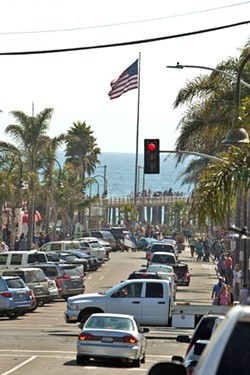The coronavirus-related shelter at home is taking its toll on everyone in SLO County, but things are looking especially bleak for coastal towns that rely heavily on tourism revenue for funding—revenue that is currently non-existent.

- File Photo By Steve E. Miller
- STAYING AFLOAT At a special meeting on March 23, Pismo Beach City Council unanimously approved a resolution authorizing the city to use up to $3 million of its $5.4 million general fund reserve to support city operations and cash flow needs in fiscal years 2020 and 2021.
Pismo Beach is already preparing for the worst. About 45 percent of Pismo's $24 million annual general fund comes from transient occupancy taxes alone, according to a city staff report, taxes charged to tourists renting rooms in hotels, inns, and other lodging facilities in town.
With non-essential businesses closed down and travel restricted, Pismo is expecting to take a major financial hit.
"The hotels are essentially empty," Pismo Mayor Ed Waage told New Times.
Restaurants and bars are limited to take-out, most wineries and retail stores are closed, and Waage said those closures trickle out and add up to fewer revenues from permits, sales taxes, lodging business improvement district assessments, and other fees that Pismo leans on for funding.
Although Pismo Beach is in comfortable position financially right now, Waage said there are concerns about how long the COVID-19 shutdowns will last and what kinds of long-term economic impacts they'll have. In a staff report, city staff anticipate losses of up to $3 million to $4 million this fiscal year.
At a special meeting on March 23, Pismo Beach City Council unanimously approved a resolution authorizing the city to use up to $3 million of its $5.4 million general fund reserve to support city operations and cash flow needs in fiscal years 2020 and 2021.
The city also passed an urgency ordinance delaying the penalties and interest fees associated with late transient occupancy taxes and lodging business improvement district assessments. The ordinance effectively gives struggling hotels and other lodging businesses until Aug. 31 to pay fees that are due to the city on March 31 and April 30.
Hotels across the nation and state are taking serious hits.
More than 125,000 hotel jobs have been lost in California because of the coronavirus pandemic, according to a press release from the American Hotel and Lodging Association. The association estimates that another roughly 414,000 jobs that support the hotel industry indirectly have also been lost.
In the press release, Pismo Beach-based hotelier and American Hotel and Lodging Association member Vijay Patel said it's been a difficult time for all hoteliers, but especially those operating small, locally owned hotels.
Mayor Waage said a good chunk of Pismo's lodging businesses are locally owned small businesses. They have fixed costs and bills and loans to pay, Waage said, and it won't be good for Pismo if any of them go out of business. He hopes the city's new ordinance offers some relief.
"I'm ever optimistic," Waage said. "We've been through other challenges and other downturns." Δ
Comments